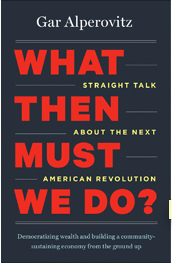Reprinted from www.yesmagazine.org
It's possible that the future of the American economy arrived 37 years ago, on a drizzly, gray day in Youngstown, Ohio. That morning, in 1977, residents woke to the news that Youngstown Sheet and Tube, a large steel mill and major provider of good, well-paying jobs in the area, was to shut its doors, putting five thousand people out of work. It was the first among a series of blows to the city, which would eventually lose half its population and sink into Rust Belt decrepitude.
The story of Youngstown figures prominently in political economist and historian Gar Alperovitz's important new book, What Then Must We Do?: Straight Talk About the Next American Revolution, because, in not a few ways, what happened to Youngstown is what's happened nearly everywhere. Cities and towns from formerly big Detroit, Mich., to tinier-than-ever Chadbourn, N.C., have watched jobs, resources, and populations dwindle, while the country's larger-order economic and ecological systems begin to fail as well.But something else happened in the wake of the day that became known around town as Black Monday: The newly-unemployed steel workers got together and, with the support of their community, built a coalition to purchase the mill and run it themselves as a worker-owned cooperative. Today, some four decades later, the notion of worker-ownership has taken hold in Ohio, a state with many worker-owned businesses and a support system for building them that's among the best in the nation.
Having diagnosed our situation as a systemic crisis, what, then, does Alperovitz recommend? As it turns out, the 1977 Youngstown coalition could provide the seed of an answer. In chapters packed with historical anecdotes and current-day examples, What Then Must We Do? shows how the steel workers' collective response to collapse is a model for economic self-determination that is spreading and deepening across the country. In Cleveland's struggling Glenville neighborhood, for example, there exists a complex of worker-owned cooperatives that sell goods and services to local hospitals--an arrangement that's providing good jobs that won't leave the area. Similar complexes are emerging elsewhere in the United States, from Pittsburgh to the Bronx. And all of this in addition to the 130 million Americans who are already members of co-ops and credit unions, the latter representing a block of capital (roughly $1 trillion) as big as one of the top five Wall Street banks.So what's going on in the richest country in the world? According to Alperovitz, the great emptying out of American communities is symptomatic of something deeper, which is the ever-increasing flow of wealth to multinational corporations. In 2014, wealth amounts to decision-making power, and Americans have watched that power move from the hands of localities to the hands of multinationals--almost none of which are rooted where they operate, and almost all of which have priorities other than community stability.
Readers of Alperovitz's previous book, America Beyond Capitalism, are likely to recognize an argument about how corporate power warps democratic politics and how things like cooperatives and community land trusts offer an alternative. But What Then Must We Do? presses further, and attempts to imagine how a new economic system built from a diversity of cooperative organizations might actually emerge, from the bottom up, in the next few decades. If that's to happen, Alperovitz argues, new economy proponents shouldn't settle for small and local; a truly serious attempt at a new economic system will require building institutions at the regional and national scales, too.
"New forms of ownership are important not only on their own," Alperovitz writes, "but also in that they begin to offer handholds on a new longer-term vision." To get there, he describes a strategy for slowly turning privately owned blocks of wealth into democratically owned blocks of wealth--in contexts that range from the health care and banking sectors to transportation infrastructure. "We are talking here about developing institutions, not just trying to change policy," Alperovitz stresses. "And the institutions we are talking about are directly concerned with the critical system question of who owns (and how to democratize) productive wealth."
It's hard to wade into these topics without tangling with some complicated ideas--I had to look up a few words in the dictionary--but Alperovitz does an admirable job of translating the academese. In each chapter, he provides concrete ideas about what a system might look like that isn't capitalism and isn't state socialism, while describing a path forward that feels robust, practical, and even a little exciting. Should we manage to head down that path, we may find proof that, in Alperovitz's words, "if you roll up your sleeves, it may well be possible to do something different."
Scott Gast wrote this article for The Power of Story, the Summer 2014 issue of YES! Magazine. Scott is assistant editor of Orion magazine. He lives in western Massachusetts.





